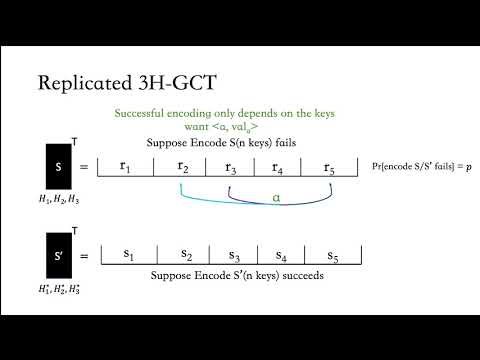CryptoDB
Oblivious Key-Value Stores and Amplification for Private Set Intersection
| Authors: |
|
|---|---|
| Download: |
|
| Conference: | CRYPTO 2021 |
| Abstract: | Many recent private set intersection (PSI) protocols encode input sets as polynomials. We consider the more general notion of an oblivious key-value store (OKVS), which is a data structure that compactly represents a desired mapping $k_i$ to $v_i$. When the $v_i$ values are random, the OKVS data structure hides the $k_i$ values that were used to generate it. The simplest (and size-optimal) OKVS is a polynomial $p$ that is chosen using interpolation such that $p(k_i)=v_i$. We initiate the formal study of oblivious key-value stores, and show new constructions resulting in the fastest OKVS to date. Similarly to cuckoo hashing, current analysis techniques are insufficient for finding *concrete* parameters to guarantee a small failure probability for our OKVS constructions. Moreover, it would cost too much to run experiments to validate a small upperbound on the failure probability. We therefore show novel techniques to amplify an OKVS construction which has a failure probability $p$, to an OKVS with a similar overhead and failure probability $p^c$. Setting $p$ to be moderately small enables to validate it by running a relatively small number of $O(1/p)$ experiments. This validates a $p^c$ failure probability for the amplified OKVS. Finally, we describe how OKVS can significantly improve the state of the art of essentially all variants of PSI. This leads to the fastest two-party PSI protocols to date, for both the semi-honest and the malicious settings. Specifically, in networks with moderate bandwidth (e.g., 30 - 300 Mbps) our malicious two-party PSI protocol has 40\% less communication and is 20-40% faster than the previous state of the art protocol, even though the latter only has heuristic confidence. |
Video from CRYPTO 2021
BibTeX
@inproceedings{crypto-2021-31243,
title={Oblivious Key-Value Stores and Amplification for Private Set Intersection},
publisher={Springer-Verlag},
doi={10.1007/978-3-030-84245-1_14},
author={Gayathri Garimella and Benny Pinkas and Mike Rosulek and Ni Trieu and Avishay Yanai},
year=2021
}

